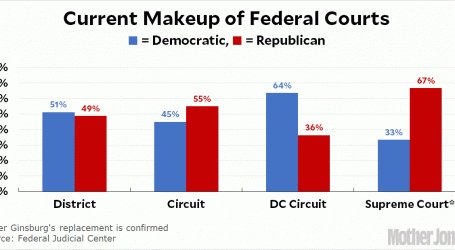US Military Owes at Least $106 Billion for Climate Damage Since 2015
Master Sgt. Becky Vanshur/ZUMA
This story was originally published by the Guardian and is reproduced here as part of the Climate Desk collaboration.
The US and UK militaries “owe” at least $111 billion in reparations to communities most harmed by their planet-heating pollution, a first-of-its-kind study calculates.
The research employs a “social cost of carbon” framework—a way to estimate the cost, in dollars, of the climate damage done by each additional ton of carbon in the atmosphere.
“The environmental costs of maintaining the global military reach of the US and UK armed forces are astonishing,” said Patrick Bigger, research director of the Climate and Community Project and co-author of the report.
According to the report, which was published by the UK-based think tank Common Wealth and the US-based Climate and Community Project, the two militaries have generated at least 474 million tons of carbon dioxide equivalent since the 2015 United Nations Paris climate agreement. That’s more than the total greenhouse gas emissions produced in the UK last year.
To offer minimal compensation for damage caused by those emissions, the US military should offer $106 billion in international climate financing, while the UK military should offer $5 billion, the researchers write, employing an equation drawn up by a Columbia University researcher in 2021.
Those figures, though eye-popping, are “extremely conservative,” the authors say. “We wanted to get a sense of the minimum scale of climate finance that both of these countries owe due to the effects of their military operations,” said Khem Rogaly, a researcher at Common Wealth and study co-author. “But it really is the minimum.”
One reason: they are based on “opaque” and “incomplete” data from the US and UK governments, which don’t include most emissions from the institutions’ supply chains. The figures omit data from 2017 and 2018, when the UK military failed to report its emissions estimates, and from 2022, which the US has not yet released. They also fail to account for certain climate impacts of military activity such as the unique climate-warming properties of jet fuel, among other issues.
The UK and the US have made some plans to clean up their militaries’ emissions imprints.
The environmental impact wreaked by the US and UK militaries extends far beyond warming from greenhouse gas emissions, the researchers say. The social cost of carbon doesn’t account for health impacts to communities near military activity—from Bikini Atoll in the Marshall Islands, where nuclear testing in the 40s and 50s led to severe environmental damage; to Vieques, Puerto Rico, where decades of US navy chemical pollution significantly increased the risk of cardiovascular and respiratory disease for locals; to Iraq, where troops’ use of depleted uranium led to widespread health issues including birth defects during the Gulf War and the 2003 invasion.
“These two militaries have about 900 bases overseas,” said Rogaly. “The effects of having all these military installations across the world is going to be extremely severe when you’re supplying them with fossil fuels, clearing land, building installations for military activity, contaminating with toxic waste.”
Basav Sen, climate policy project director at the Institute for Policy Studies think tank, who reviewed the report, said the research is “crucial.”
“We can’t account for our emissions without accounting for the military-industrial complex,” he said.
Militaries are among the world’s biggest contributors to the climate crisis, accounting for 5.5 percent of all global greenhouse gas emissions, one 2022 estimate from international experts found.
The new study’s researchers said they focused on the US and UK militaries specifically because they have been “architects of the modern fossil fuel economy” since the Industrial Revolution.
“The country where the Industrial Revolution started was Britain,” said Sen. “It was built on capital, free labor and land they got by colonizing people…around the global south.”
The US, meanwhile, has became the “successor state to Britain” by becoming the world’s top imperial superpower, said Sen. “The role of US military power in keeping the world safe for capitalist [fossil fuel] extraction can’t be overstated,” he said.





